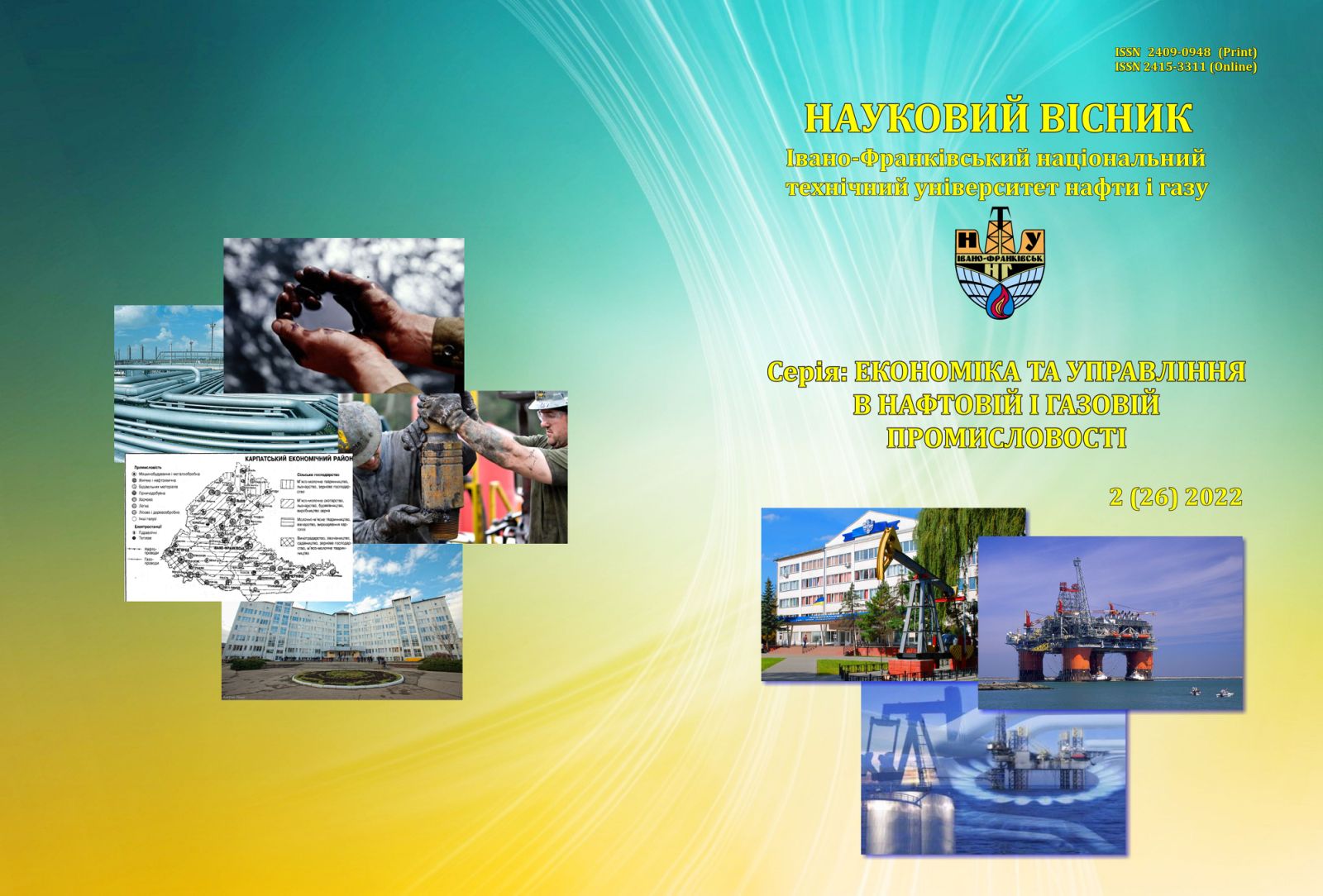INTELLECTUAL MODEL OF ENTERPRISES INNOVATIVE DEVELOPMENT IN THE KNOWLEDGE-BASED ECONOMY PARADIGM
DOI:
https://doi.org/10.31471/2409-0948-2022-2(26)-65-78Keywords:
innovative enterprise; intellectual potential; intellectual support for innovative development of enterprises; organizational knowledge; intellectual and innovative activity; innovative development.Abstract
The problem of intellectual support for the innovative development of Ukrainian enterprises in the formation of a knowledge-based economy was studied. Emphasis is placed on the fact that the paradigm of the knowledge economy provides the creation of certain conditions through long-term investments in science, education, innovative systems development, information infrastructure constant modernization, and the creation of a favorable environment for market innovations. Under these conditions, intellectual potential is an integrating indicator of internal sources, opportunities, rational solution means of social, cultural, scientific and technical problems, including valuable knowledge of enterprises. An analytical assessment of Ukrainian enterprises intellectual potential and innovative capacity parameters was carried out. A conclusion was made about the high potential and ineffective use of intellectual resources, which negatively affects the innovative development of entrepreneurship. The results of conceptual modeling are indicated, within the framework of which the author's definition of the category "intellectual support of the enterprise innovative development" essence is given. An algorithm for the functioning of the innovative development intellectual support system was formulated for the effective transfer of knowledge between the interaction participants. The structural aspects of the specified system were determined. Methodological principles were developed that ensure effective functioning and regulation (targeted self-organization) of enterprises innovative development intellectual support system from the standpoint of a synergistic management concept. An enterprises innovative development intellectual support model was formed in two ways: on the macro- and micro-levels, which reveals the subjective composition of its participants and the mechanisms of their interaction. It was substantiated the expediency of intellectual support infrastructure forming based on new forms of the innovative enterprise organization, which contribute to the economy innovation. It was confirmed the position regarding the formation and implementation of educational and scientific institutions "third mission" – scientific research and development commercialization, which leads to the new type of universities appearance – entrepreneurial universities. The proposed conceptual approaches, models and mechanisms of the enterprises innovative development intellectual support system reveal new standards of system participants’ interaction, as well as effective use of intellectual potential and intellectual capital development.
References
Ostrovska H., Tsikh H., Strutynska I., Kinash I., Pietukhova O., Golovnya О., Shehynska N. Building an effective model of intelligent entrepreneurship development in digital economy. Eastern-European Journal of Enterprise Technologies. 2021. 6 (13 (114)). Р. 49–59. doi: https://doi.org/10.15587/1729-4061.2021.244916
Amosha O. I., Pidorycheva I. Yu., and Zemliankin A. I. Trends in the World Economy Development: New Challenges and Prospects. Sci. innov. 2021. V. 17. № 1. P. 3–17. doi: https://doi.org/10.15407/scine17.01.003
Булеев И. П., Булеев Е. И., Брюховецкий Я. С. Интеллектуализация труда – основа развития современной экономики. Стратегія і механізми регулювання промислового розвитку. 2016. С. 3–18. URL: http://nbuv.gov.ua/UJRN/sim_2016_2016_3
Ситник Й. С. Інтелектуалізація систем менеджменту підприємств: концепція, системний моніторинг та моделювання: моногр. Львів: Видавництво Львівської політехніки. 2017. 380 с.
Лук’яненко Д. Г., Мозгаллі О. П., Лук’яненко О. Д., Дворник І. В., Орєхов М. О. Цифровий імператив трансформації діяльності університетів. Financial and Credit Activity Problems of Theory and Practice. 2021.№ 4 (35). С. 449–458. doi: https://doi.org/10.18371/fcaptp.v4i35.222478
Shevchenko L. S. Mergers and Acquisitions in Higher Education. Actual Problems of Economics. 2016. № 11. С. 160-167. URL: http://nbuv.gov.ua/UJRN/ape_2016_11_18
Щербак В. Г. Розвиток інтелектуального підприємництва вищого навчального закладу. Вісник Київського національного університету технологій та дизайну. 2017. № 4. С. 34–43. URL: http://nbuv.gov.ua/UJRN/vknutden_2017_4_6
Перерва П. Г., Максименко Я. А., Сокол К. М., Климова С. О. Інтелектуально-інноваційна діяльність України в контексті вимог європейського співтовариства. Вісник НТУ «ХПІ». URL: http://repository.kpi.kharkov.ua/bitstream/KhPI-Press/49735/1/Pererva_Intelektualno-innovatsiina_2020.pdf
Січкаренко К. О. Мережева організація інноваційної діяльності: наукова доповідь. НАН України, ДУ «Інститут економіки та прогнозування НАН України». Київ. 2015. 48 с.
Бажал Ю. М. Розвиток інноваційної діяльності у знаннєвому трикутнику «держава – університети – промисловість». Економіка і прогнозування. 2015. № 1. С. 76-88. URL: http://nbuv.gov.ua/UJRN/econprog_2015_1_8
Joy-Matthews J., Megginson, D., Syurte M. Human Resources Development. 2006. 432 c.
The Bloomberg innovation index. Bloomberg 2022: веб-сайт. URL: https://worldpopulationreview.com/country-rankings/most-innovative-countries
Крилов Д. В. Аналіз рейтингового оцінювання розвитку інноваційної діяльності в Україні. Ефективна економіка. 2022. doi: 10.32702/2307-2105-2022.5.8 URL: http://www.economy.nayka.com.ua/pdf/5_2022/10.pdf
Островська Г. Й. Ефективне використання інтелектуального потенціалу як пріоритет забезпечення економічного розвитку. Економічний вісник Донбасу. № 1 (63), 2021. С. 171–178. doi: 10.12958/1817-3772-2021-1(63)-171-178.
OECD. Oslo Manual Guidelines For Collecting, Reporting Aand Using Data on Innovation (4th edition). The Measurement of Scientific, Technological and Innovation Activities, OECD Publishing, Paris/Eurostat, Luxembourg. 2018. doi: https://doi.org/10.1787/9789264304604–en
Lisovska L., Yurynets O., Sheremeta B. Changing the paradigm of the innovation process on the basis of interaction. Problems of economy and management. 2020. Vol. 4. № 1. Р. 174–187 doi: https://doi.org/10.23939/semi2020.01.174
Downloads
Published
How to Cite
Issue
Section
License
Copyright and Licensing Terms
Copyright Statement
The authors who publish in the journal accept the following conditions:
- The authors retain the copyright and grant the journal the right of first publication, licensed with Creative CommonsCC BY-NC-SA , which permits other people to remix, transform, and build upon the material and use the material for non-commercial purposes, give appropriate credit and distribute the contributions under the same license as the original.
- The authors can conclude additional agreements on the non-exclusive distribution of the journal’s published version of the work (for example, publication of the work in electronic repositories) with an acknowledgment of its initial publication in this journal.
- The authors can upload the published articles on the Internet (for example, in electronic repositories or on web-sites), as it will stimulate fruitful scholarly discussions and increase the citation rates of the published articles.


1.png)


1.png)





